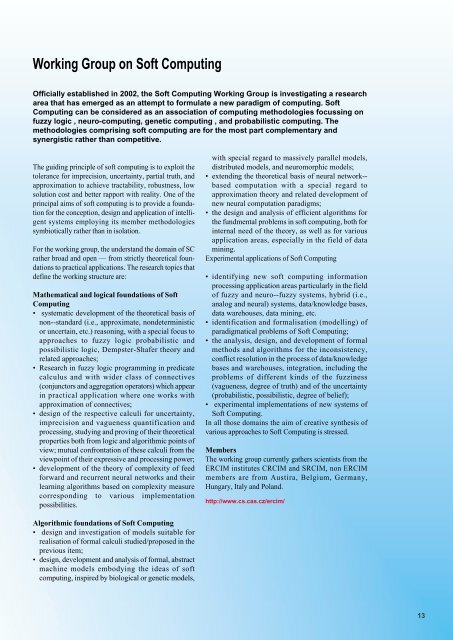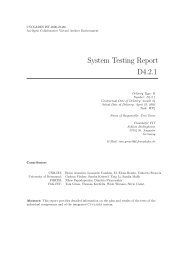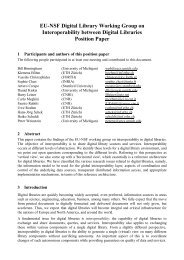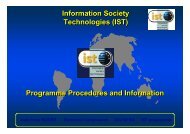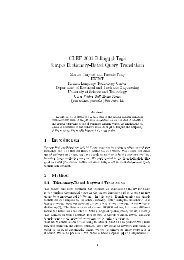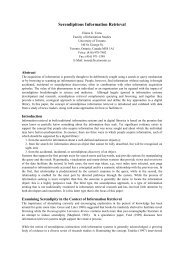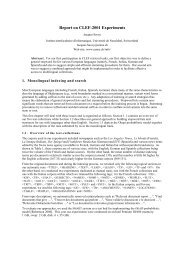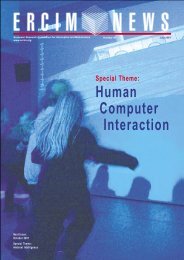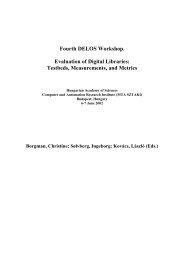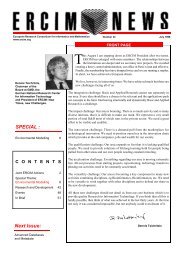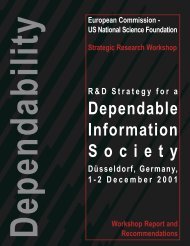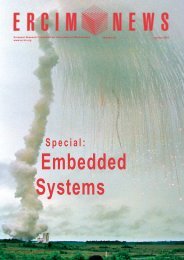Annual Report 2002 - ERCIM
Annual Report 2002 - ERCIM
Annual Report 2002 - ERCIM
Create successful ePaper yourself
Turn your PDF publications into a flip-book with our unique Google optimized e-Paper software.
Working Group on Soft Computing<br />
Officially established in <strong>2002</strong>, the Soft Computing Working Group is investigating a research<br />
area that has emerged as an attempt to formulate a new paradigm of computing. Soft<br />
Computing can be considered as an association of computing methodologies focussing on<br />
fuzzy logic , neuro-computing, genetic computing , and probabilistic computing. The<br />
methodologies comprising soft computing are for the most part complementary and<br />
synergistic rather than competitive.<br />
The guiding principle of soft computing is to exploit the<br />
tolerance for imprecision, uncertainty, partial truth, and<br />
approximation to achieve tractability, robustness, low<br />
solution cost and better rapport with reality. One of the<br />
principal aims of soft computing is to provide a foundation<br />
for the conception, design and application of intelligent<br />
systems employing its member methodologies<br />
symbiotically rather than in isolation.<br />
For the working group, the understand the domain of SC<br />
rather broad and open — from strictly theoretical foundations<br />
to practical applications. The research topics that<br />
define the working structure are:<br />
Mathematical and logical foundations of Soft<br />
Computing<br />
• systematic development of the theoretical basis of<br />
non--standard (i.e., approximate, nondeterministic<br />
or uncertain, etc.) reasoning, with a special focus to<br />
approaches to fuzzy logic probabilistic and<br />
possibilistic logic, Dempster-Shafer theory and<br />
related approaches;<br />
• Research in fuzzy logic programming in predicate<br />
calculus and with wider class of connectives<br />
(conjunctors and aggregation operators) which appear<br />
in practical application where one works with<br />
approximation of connectives;<br />
• design of the respective calculi for uncertainty,<br />
imprecision and vagueness quantification and<br />
processing, studying and proving of their theoretical<br />
properties both from logic and algorithmic points of<br />
view; mutual confrontation of these calculi from the<br />
viewpoint of their expressive and processing power;<br />
• development of the theory of complexity of feed<br />
forward and recurrent neural networks and their<br />
learning algorithms based on complexity measure<br />
corresponding to various implementation<br />
possibilities.<br />
Algorithmic foundations of Soft Computing<br />
• design and investigation of models suitable for<br />
realisation of formal calculi studied/proposed in the<br />
previous item;<br />
• design, development and analysis of formal, abstract<br />
machine models embodying the ideas of soft<br />
computing, inspired by biological or genetic models,<br />
with special regard to massively parallel models,<br />
distributed models, and neuromorphic models;<br />
• extending the theoretical basis of neural network-based<br />
computation with a special regard to<br />
approximation theory and related development of<br />
new neural computation paradigms;<br />
• the design and analysis of efficient algorithms for<br />
the fundmental problems in soft computing, both for<br />
internal need of the theory, as well as for various<br />
application areas, especially in the field of data<br />
mining.<br />
Experimental applications of Soft Computing<br />
• identifying new soft computing information<br />
processing application areas particularly in the field<br />
of fuzzy and neuro--fuzzy systems, hybrid (i.e.,<br />
analog and neural) systems, data/knowledge bases,<br />
data warehouses, data mining, etc.<br />
• identification and formalisation (modelling) of<br />
paradigmatical problems of Soft Computing;<br />
• the analysis, design, and development of formal<br />
methods and algorithms for the inconsistency,<br />
conflict resolution in the process of data/knowledge<br />
bases and warehouses, integration, including the<br />
problems of different kinds of the fuzziness<br />
(vagueness, degree of truth) and of the uncertainty<br />
(probabilistic, possibilistic, degree of belief);<br />
• experimental implementations of new systems of<br />
Soft Computing.<br />
In all those domains the aim of creative synthesis of<br />
various approaches to Soft Computing is stressed.<br />
Members<br />
The working group currently gathers scientists from the<br />
<strong>ERCIM</strong> institutes CRCIM and SRCIM, non <strong>ERCIM</strong><br />
members are from Austira, Belgium, Germany,<br />
Hungary, Italy and Poland.<br />
http://www.cs.cas.cz/ercim/<br />
13


